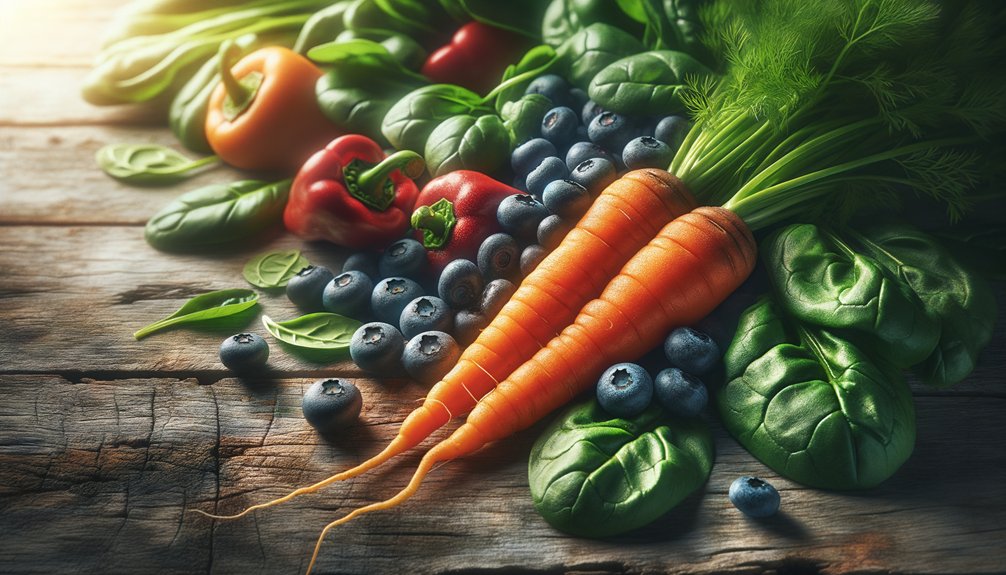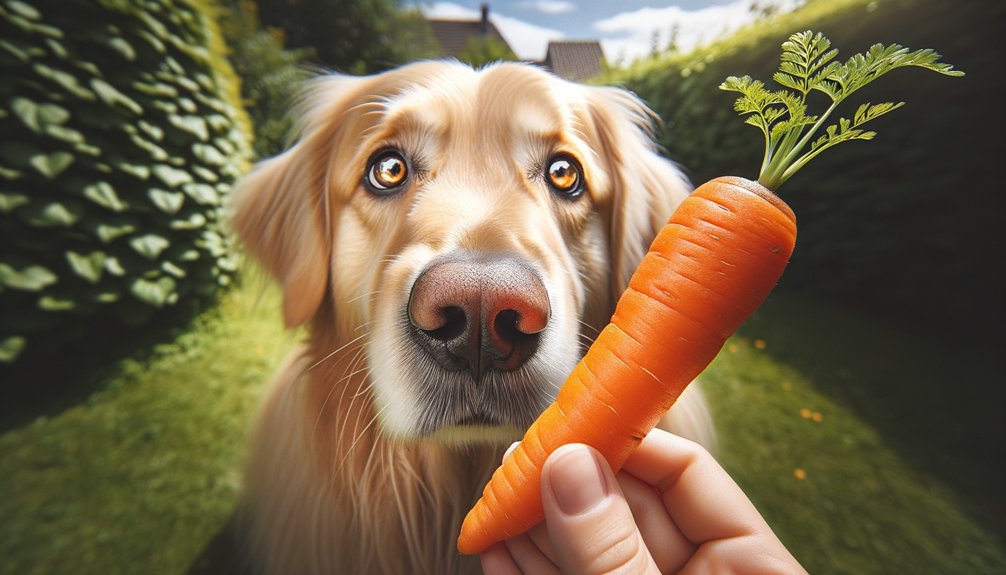AI-assisted
Last updated on June 18, 2025
Carrots are popularly touted as a miracle for enhancing canine vision; however, biochemical and physiological scrutiny reveals a far more nuanced reality. Although carrots offer significant beta‐carotene—a precursor to vitamin A, essential for retinal function—the metabolic conversion in dogs is notably inefficient compared to humans. Rather than serving as a comprehensive solution for vision improvement, this nutritional factor integrates into a broader, multifaceted system governing ocular health. Thus, while beta‐carotene remains critical for eye function, its diminished bioavailability in canines debunks any simplistic claims of dramatic visual enhancement through carrot supplementation alone.
Key Takeaways
- Dogs convert beta-carotene from carrots to vitamin A less efficiently than humans, limiting its impact on canine vision.
- Vitamin A from direct dietary sources is more effective for dog eye health than beta-carotene in carrots.
- Scientific evidence shows carrots do not significantly improve dogs’ visual acuity or color perception.
- Canine vision relies on multiple nutrients; carrots alone cannot dramatically enhance eyesight.
- Promoting balanced diets with omega-3s and antioxidants better supports dog ocular health than relying solely on carrots.
The Science Behind Beta-Carotene and Canine Vision

You need to understand that beta-carotene, a precursor to vitamin A, plays a vital role in maintaining retinal health, which influences a dog’s visual function. However, canine visual abilities depend on multiple factors, including rod and cone cell distributions, which differ from humans.
Beta-Carotene Role
Although beta-carotene is widely recognized as a precursor to vitamin A, its specific impact on canine vision involves complex biochemical processes that differ from those in humans. In dogs, beta-carotene undergoes enzymatic conversion within the intestinal mucosa to form retinol, which is essential for the synthesis of retinal, a chromophore critical to the phototransduction pathway in rod and cone cells.
When considering beta-carotene for dogs in a dog vision health diet, it’s important to recognize that dietary retinol sources typically provide more direct vitamin A availability, since dogs convert beta-carotene less efficiently.
As a result, while beta-carotene contributes indirectly to maintaining visual function, its role in supporting retinal health is supplementary rather than primary, emphasizing the need for balanced nutrient sources in dietary formulations aimed at preserving canine vision health.
Dogs Visual Abilities
Understanding the science behind beta-carotene’s involvement in canine vision requires examining the specific visual capabilities of dogs, which differ markedly from those of humans.
Dogs have dichromatic vision, meaning their color perception is limited primarily to blues and yellows, unlike the trichromatic vision humans possess. Their visual acuity is lower, but they excel in low-light conditions due to a higher density of rod cells in the retina.
Beta-carotene, found in carrots, is a precursor to vitamin A, essential for maintaining retinal health and proper functioning of photoreceptor cells. While dog carrots health benefits include providing beta-carotene, the conversion efficiency in dogs is limited, suggesting that carrots alone don’t substantially enhance dogs visual abilities.
Therefore, understanding these physiological traits clarifies the realistic impact of beta-carotene on canine vision.
Myth Versus Reality: Unraveling Common Misconceptions
When examining the widespread belief that carrots substantially enhance a dog’s vision, it becomes essential to differentiate between anecdotal assertions and scientifically supported facts, as this distinction clarifies the extent to which nutritional components influence ocular health.
Current carrots dog vision research indicates that while carrots contain beta-carotene, a precursor to vitamin A important for eye function, the actual impact on a dog’s vision is limited. The myth vs fact dog vision carrots debate often overlooks the complexity of canine ocular physiology and other critical nutrients involved.
Consequently, you should understand that feeding carrots may contribute modestly to overall health but doesn’t dramatically improve vision. Recognizing this helps you provide accurate guidance to others who seek to support their dogs’ visual well-being effectively and responsibly.
Expert Insights: Carrots Compared to Other Vision-Boosting Foods
Since carrots contain beta-carotene, which the body converts into vitamin A, they do offer some benefits for eye health; however, when comparing them to other vision-enhancing foods, it becomes evident that certain nutrients found in alternative sources provide more targeted support for canine ocular function.
While carrots for dogs benefits include supplying essential antioxidants, foods rich in omega-3 fatty acids, such as fish oil, and those containing lutein and zeaxanthin, like leafy greens, have demonstrated greater efficacy in maintaining retinal health and reducing oxidative stress.
Therefore, incorporating a variety of vision boosting foods for dogs ensures a broader spectrum of nutrients necessary for ideal eye function.
Understanding these distinctions allows you to make informed dietary choices that better support your dog’s visual health beyond relying solely on carrots.



